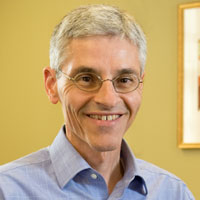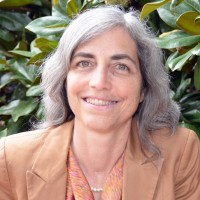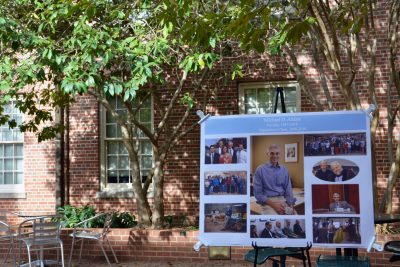Endowment honors Aitken’s commitment to innovation during Environmental Science and Engineering centennial
February 7, 2022

Dr. Michael Aitken
As part of a series of events to mark its centennial, the Department of Environmental Sciences and Engineering (ESE) at the UNC Gillings School of Global Public Health held a symposium in early November that included a special dedication to the late Michael Aitken, PhD, and the announcement of an endowment established in his name.
The Michael D. Aitken Endowment for Environmental Sciences and Engineering supports the entire department by providing discretionary funds to ESE’s chair. These discretionary funds will enable the chair to respond to opportunities and needs as ESE faculty and students pursue solutions to emerging threats to the environment and public health and well-being.
As an individual and a leader, Aitken focused on minimizing and remediating human impacts on the environment. Practicing what he preached, he rode his bike to work every day, and as a leader, he did the most with the tools at his disposal — seeing the potential to use resources to accomplish real and lasting good.

Dr. Barbara J. Turpin
“As chair, Mike prioritized the department’s most valuable resources, our junior faculty and students,” said Barbara J. Turpin, PhD, professor and chair of ESE. “He was also very good at communicating what a special place ESE is. We will benefit from these investments for a long time to come.”
Aitken was chair of the Department of Environmental Sciences and Engineering from 2006–2016, and according to his wife, Betsy Bea Rudolph, he would have greatly appreciated having a fund like this to use on deserving projects and initiatives during his time as chair.
Aitken was committed to doing the dirty work, exploring innovative methods to clean up environmental disasters at U.S. Superfund sites, and his research and leadership found a natural fit in the Gillings School’s ESE department. Combining environmental health, science and engineering, the department is uniquely positioned to address environmental challenges that are increasingly complex and require solutions that are integrated and holistic. Faculty and students in ESE are increasingly planning for and responding to emerging public health threats, including those posed by aerosol-borne viruses, contaminated floodwaters, antibiotic resistance, the increasing effects of drought-induced wildfires on air quality, and water shortages driven by climate change.
The department celebrated its centennial by affirming its commitment to provide environmental solutions for public health protection and to build resilience to climate and environmental change. This affirmation continues a century of impact in North Carolina and worldwide. It began with a need to improve water safety in towns and cities across N.C. in 1920, followed by providing the first director of environmental health for the World Health Organization. By the ‘70s, 25% of ESE graduates were working with international health organizations and foreign governments. And today’s contributions include Superfund research, understanding exposures to per- and polyfluoroalkyl substances (“PFAS forever chemicals”), global efforts to provide safe drinking water through the UNC Water Institute, and contributions to atmospheric chemistry and the global burden of disease from air pollution. The symposium where Aitken’s endowment was announced was named in honor of the late Philip C. Singer, PhD, a nationally renowned expert in water-quality issues and a member of the National Academy of Engineering.

The dedication to Dr. Aitken took place in the Rosenau Courtyard at the Gillings School
This endowment will support work in ESE that has lasting implications for all of us as well as our water, air and soil. By joining with Betsy to support this fund, you can increase this impact. Make a contribution to the Michael D. Aitken Endowment for Environmental Sciences and Engineering today to support the next century of innovation. Any questions can be directed to Matt Cain, MEd, director of development, at mattcain@email.unc.edu.
Read more about Aitken’s legacy.
Contact the UNC Gillings School of Global Public Health communications team at sphcomm@unc.edu.
